In the field of international geopolitics, economic sanctions have emerged as a powerful non-military tool to target and influence the behavior of states. Russian sanctions imposed by the US and administered by the Office of Foreign Assets Control (OFAC) are a prime example of this dynamic. In this analysis, we aim to examine how OFAC responded to the Russia sanctions, what those sanctions entailed, and the resulting consequences.
Historical background:
US sanctions against Russia enforced by OFAC date back to Russia’s 2014 annexation of Crimea. These actions were seen as a violation of Ukraine’s sovereignty and international law, leading to immediate condemnation and a range of sanctions.
Basic rules of Russian sanctions:
Asset Freezing and Sanctions: OFAC’s Specially Designated Nationals (SDN) list includes individuals and entities associated with Russian government activities in Crimea and eastern Ukraine. Assets of these persons/entities in the U.S. jurisdiction will be frozen, and persons in the U.S. they will be prohibited from doing business with them.
Sector-Specific Sanctions: Unlike blanket bans, these sanctions target specific sectors of the Russian economy, such as finance, energy, and defense. They have limited access to US financial markets and the services of related organizations.
Restrictions on goods and technologies: The sanctions specifically target the supply of certain goods and technologies that could increase Russia’s domestic oil production capacity. Diplomatic expulsions: In addition to economic measures, diplomatic sanctions have been imposed, including the expulsion of Russian diplomats from the United States and the closure of some Russian diplomatic facilities.
Effects and effects:
Economic impact: While it is difficult to separate the impact of the sanctions from other economic factors, they have contributed to the poor performance of the Russian economy, which has had a significant impact on foreign direct investment, technology transfer and the wider business environment.
Political Consequences: Sanctions have increased political tensions between the United States and Russia.
Russia retaliated against Western interests with a series of sanctions of its own and strengthened its domestic policy of economic independence. Global trade and finance: Given the dominance of the US financial system and the global nature of supply chains, global organizations have had to navigate a maze of compliance to avoid inadvertently violating sanctions. This has led to a focus on due diligence and the reform of certain business relationships.
Final Thoughts:
OFAC’s role in imposing and administering Russian sanctions demonstrates the complexity of using economic measures as a foreign policy tool. While these sanctions have had an impact on the Russian economy, measuring their success in achieving broader geopolitical goals remains controversial.
As with most sanctions regimes, the challenge is to balance economic pressure and diplomatic overreach while ensuring that economic measures achieve broader strategic objectives without escalating tensions or harming innocent civilians. OFAC’s Russian sanctions have been an example of this delicate balancing act for many years.
Author: Pooyan Ghamari, Swiss Economist & Visionary







